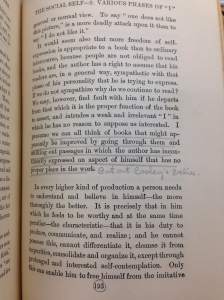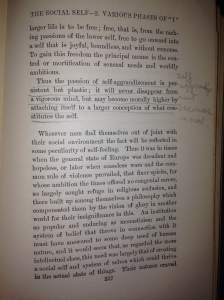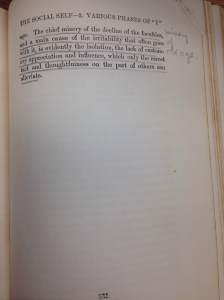For this assignment, I intentionally pursued psychology books of the 19th century, curious to see how people would react to psychological perspectives of the time. Charles Horton Cooley’s “Human Nature and the Social Order” was my book of choice and had some interesting marginalia. The book was published in New York in 1902 by Charles Scribners’ Sons and describes early social psychology and sociological view points. Throughout the entire book, there is underlining of key points, but one particular chapter titled “The Social Self – Various Phases of I,” I found marginalia.
http://www.booktraces.org/book-submission-human-nature-and-the-social-order/
On page 193, the marginalia says “Cut out Cooley’s babies,” following a phrase that had been underlined. The phrase speaks to the idea of the ego of an author slipping through their written work in a way that has no connection to the work itself. The written comment, “Cut out Cooley’s babies” could be a note to the reader to remember to overlook Cooley’s own examples of personal anecdotes slipping into the text at hand. I researched Charles Horton Cooley and could not find anything about him that related specifically to babies. In the Amazon.com review of this book, Cooley is described as a pioneer of sociological views on American culture. His ideas were the catalyst for change in how sociology revolving around the self was approached pedagogically. The passage that is underlined on page 193 suggests that the reader be a critical thinker for not just content, but for the perspectives of authors writing the content.
On page 227 in the same chapter about Various Phases of “I,” the following sentence is underlined:
Thus the passion of self-aggrandizement is persistent but plastic; it will never disappear from a vigorous mind, but may become morally higher by attaching itself to a larger conception of what constitutes the self.” The marginalia beside the underlining says “self-aggrandizement becomes moral.” This trace of a reader’s idea seems to be the summary of the sentence that resonated most with them. The concept of “self-aggrandizement” means process of promoting oneself as being powerful or important. The marginalia therefore is a synopsis of the idea that as one’s sense of self grows and becomes more attached to one’s morals, self-aggrandizement therefore becomes moral.
Finally, on page 231, at the end of the chapter, the sentenced underlined is “The chief misery of the decline of the faculties, and a main cause of the irritability that often goes with it, is evidently the isolation, the lack of customary appreciation and influence, which only the rarest tact and thoughtfulness on the part of others can alleviate.” This description of the self that is underlined is referring to the later idea of the self and the marginalia says “misery of old age.” This summarizes the underlined phrase concisely and quiet honestly as well.


